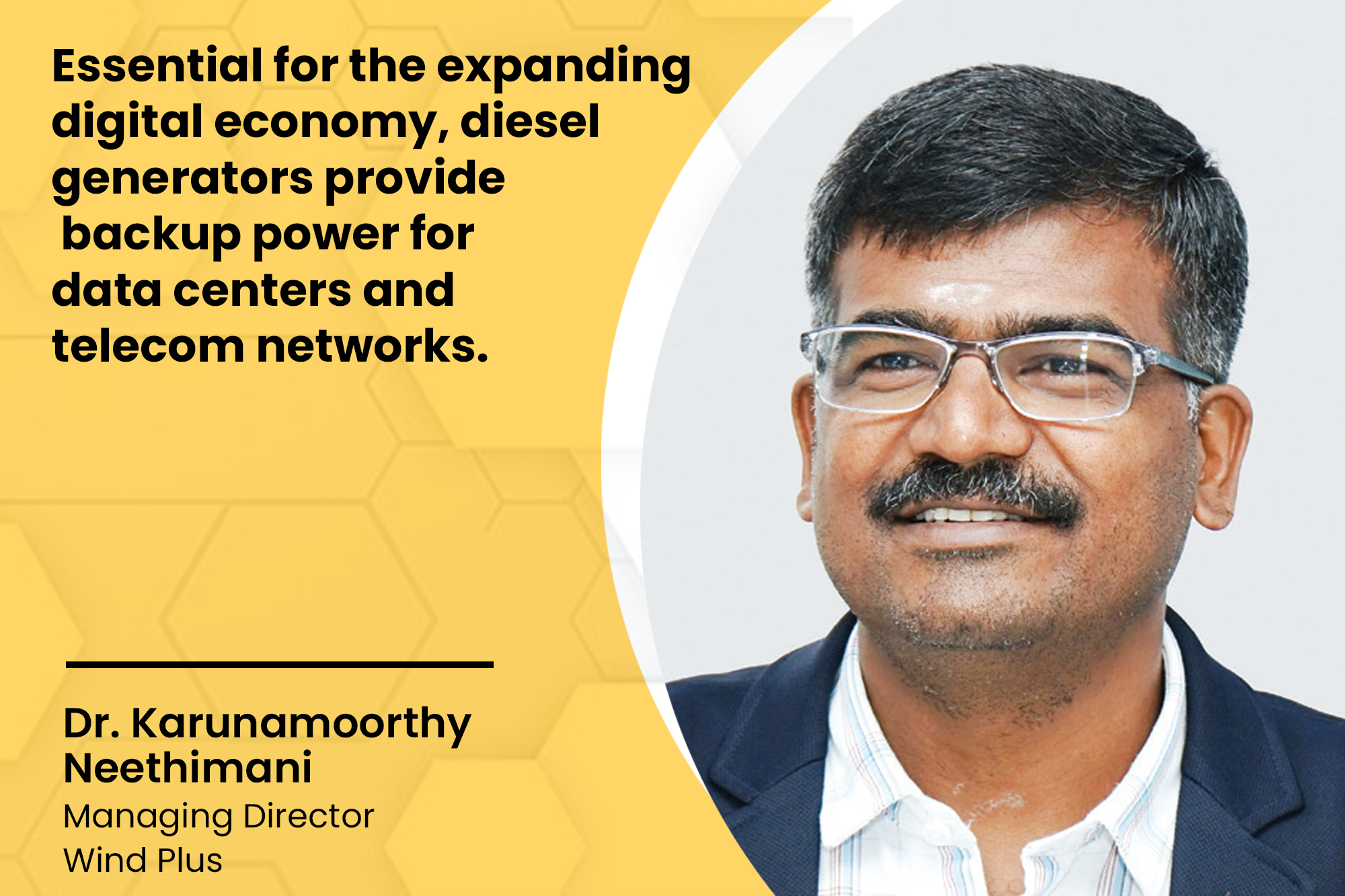Growth factors behind power genset business in India
By EPR Magazine Editorial January 3, 2024 4:32 pm IST
By EPR Magazine Editorial January 3, 2024 4:32 pm IST

Essential for the expanding digital economy, diesel generators provide backup power for data centers and telecom networks.
The power genset sector is witnessing growth driven by urbanisation, microgrid adoption, infrastructure projects, and emerging enterprises. Aligning with broader energy transformations, gensets support decentralisation, fuel diversity, and smart grid integration. Dr. Karunamoorthy analyses the insights of the industry with the EPR Magazine.
Current trends fuelling growth
Rapid urbanisation intensifies power demand, prompting grid expansion, with diesel generators addressing gaps in supply. Microgrid development in urban areas, facing unreliable grids, benefits from flexible and independent power provision of diesel generators. Infrastructure projects, reliant on temporary power, leverage diesel generators for reliable and mobile solutions.
Remote locations lacking grid access, such as construction camps and mines, depend on diesel generators. Industries vital for economic growth utilise diesel generators for uninterrupted power during grid outages. Essential for the expanding digital economy, diesel generators provide backup power for data centres and telecom networks.
Aligning with energy sector transformations, diesel generators support decentralisation, fuel diversity, and smart grid integration. To enhance sustainability, integrating clean fuels, advancing smart grid technologies, and envisioning a decentralised energy future are critical for the long-term compatibility of diesel generators with broader energy revolutions.
Efficiency and overall sustainability in power generation
The emergence of advanced technologies is enhancing the efficiency and sustainability of electricity generation. Advanced energy storage, such as high-capacity and flow batteries, is crucial in storing excess energy from renewable sources, preventing energy waste, and stabilising the grid. Digital twin technology involves creating virtual replicas of power plants or grids for real-time monitoring, analysis, and efficiency improvements, resulting in increased predictability.
Internet of Things (IoT) applications in the energy sector utilise sensors and connected devices for real-time monitoring and control, enabling better demand-side management and reducing energy waste. Carbon Capture and Storage (CCS) technologies capture and store carbon dioxide emissions, mitigating greenhouse gas emissions and lessening the environmental impact of fossil fuel power generation. Artificial Intelligence (AI) and Machine Learning optimise power plant performance, predict equipment failures, and enhance overall system efficiency, enabling more accurate forecasting and decision-making.Advanced Wind Turbine Technology, with innovations like larger and more efficient blades and floating and airborne systems, improves the efficiency and expands the potential of wind energy production. Collectively, these emerging technologies contribute to a more efficient, sustainable, and resilient power generation landscape, addressing challenges related to climate change, resource depletion, and environmental impact.
Strategies to stay competitive
Companies are strategically adopting key approaches to enhance efficiency and sustainability in the evolving energy landscape. Deployment of smart technologies, including smart grids and IoT, facilitates effective energy distribution and consumption monitoring. Integration of Data Analytics and AI enables insightful decision-making, optimising energy consumption. Transitioning to Circular Economy Practices reduces environmental impact by promoting waste reduction and product longevity.
Embracing customer-centric solutions, such as personalised energy plans, enhances customer satisfaction. Additionally, mergers and acquisitions are employed for market consolidation, technology acquisition, and geographical expansion, ensuring competitiveness in the dynamic energy sector. These diverse strategies showcase the adaptability and innovation companies employ to thrive in the rapidly changing energy environment, promoting long-term success.
Cleaner and more resilient power landscape
Industry players can capitalise on various opportunities in pursuit of a cleaner and more resilient power landscape. Adopting innovative business models such as energy-as-a-service offers a holistic approach to meeting energy needs. Corporate decarbonisation solutions enable businesses to eliminate carbon emissions across operations and supply chains. Strategic investments in battery energy storage systems, offshore wind, and green hydrogen enhance grid stability and renewable energy capacity. Collaboration with policymakers to formulate incentivising policies for renewables and smart grids is crucial. As industry players embrace these opportunities, their mindset and actions will be pivotal in driving positive transformations in the power sector.
Spokesperson: Dr. Karunamoorthy Neethimani, Managing Director- Wind Plus
We use cookies to personalize your experience. By continuing to visit this website you agree to our Terms & Conditions, Privacy Policy and Cookie Policy.